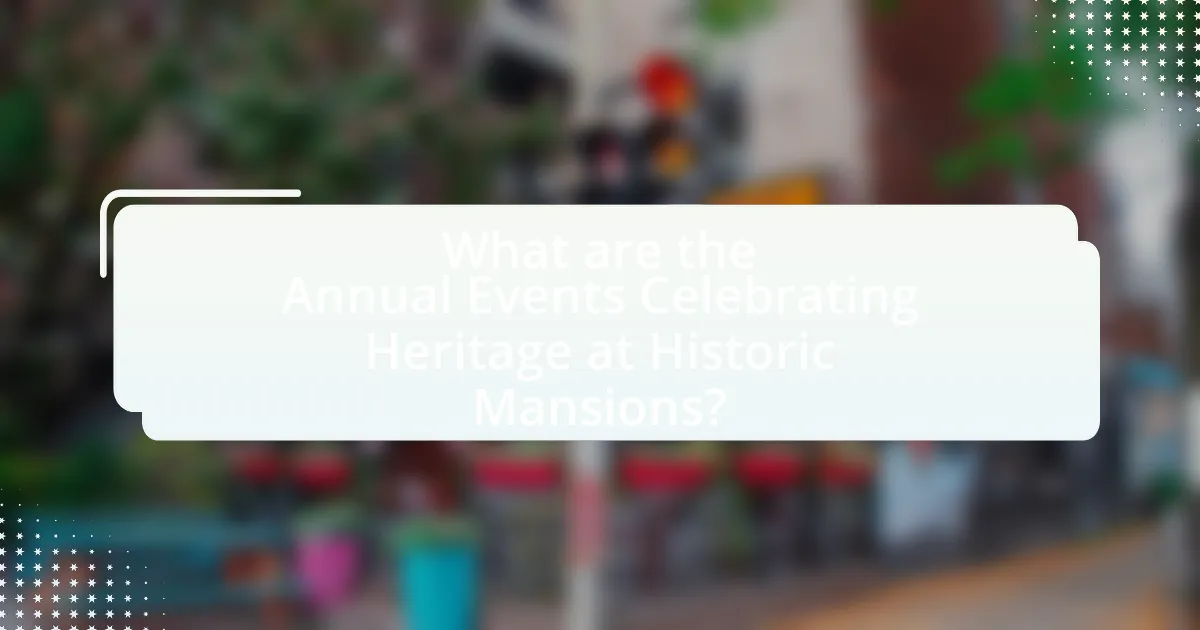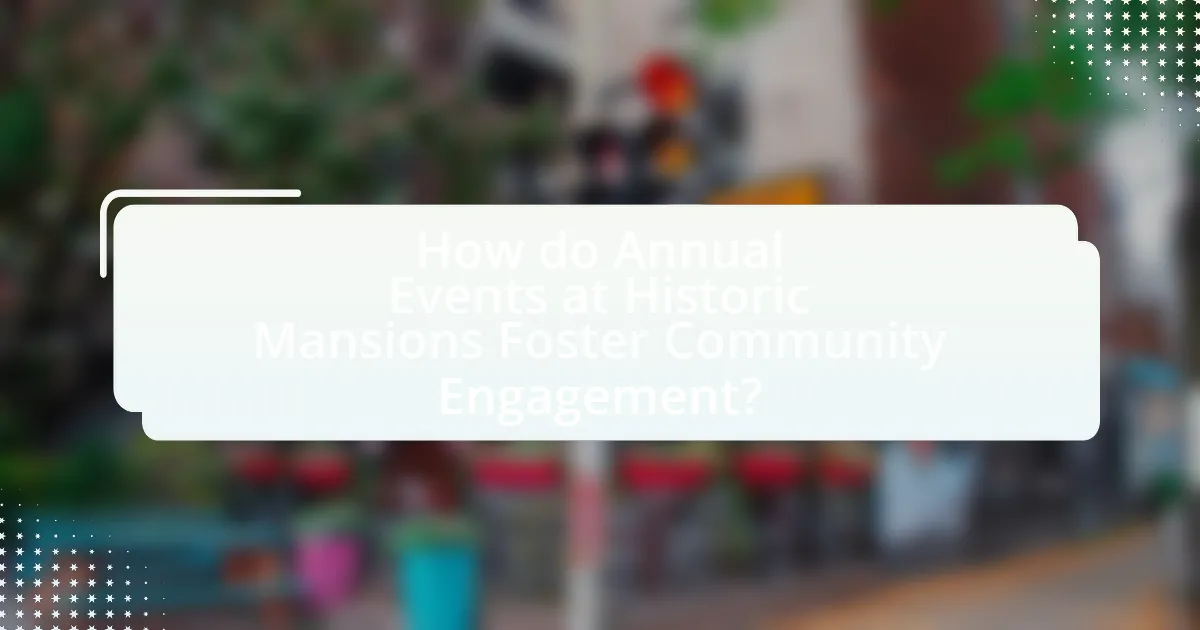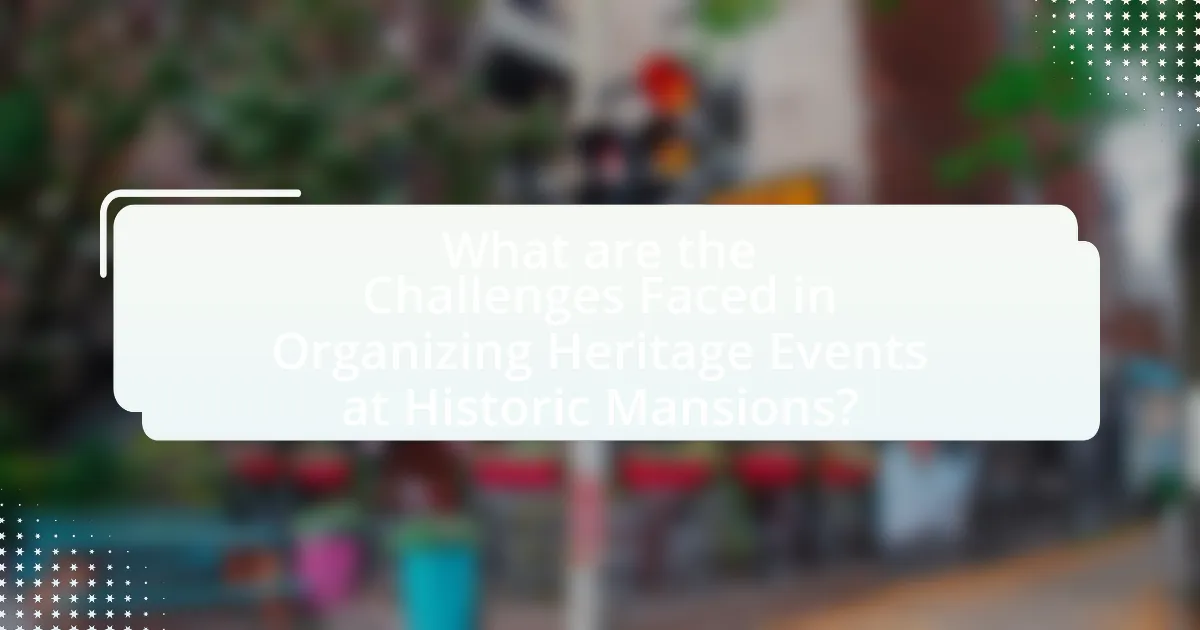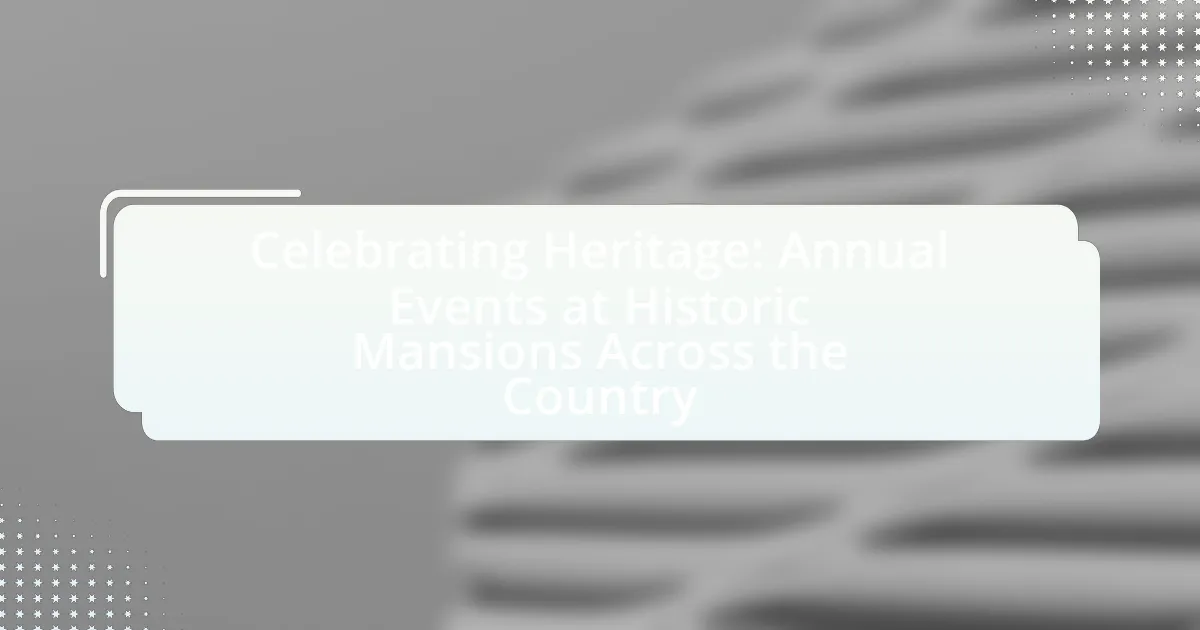The article focuses on annual events celebrating heritage at historic mansions across the country, highlighting their role in promoting cultural preservation and community engagement. It outlines various types of events, such as heritage festivals, open house days, and themed tours, which showcase architectural significance and cultural narratives. The piece discusses how these events foster local pride, support tourism, and enhance economic development while addressing challenges related to preservation and logistics. Additionally, it emphasizes the importance of community involvement and volunteer participation in the planning and execution of these heritage celebrations.

What are the Annual Events Celebrating Heritage at Historic Mansions?
Annual events celebrating heritage at historic mansions include heritage festivals, open house days, and themed tours. These events often showcase the architectural significance, historical context, and cultural narratives associated with the mansions. For example, many historic mansions host annual heritage festivals that feature traditional crafts, music, and food, allowing visitors to engage with the local culture and history. Open house days provide opportunities for the public to explore the interiors and learn about the mansion’s history through guided tours. Themed tours, such as those focusing on specific historical periods or notable figures, further enhance the educational experience. These events not only promote awareness of heritage but also contribute to the preservation of these historic sites.
How do these events contribute to cultural preservation?
Annual events at historic mansions contribute to cultural preservation by actively engaging communities in the celebration and education of their heritage. These events provide opportunities for participants to learn about historical practices, traditional crafts, and local customs, thereby fostering a sense of identity and continuity. For instance, events like reenactments or festivals often showcase authentic historical attire and culinary traditions, which help to keep these practices alive. Furthermore, they encourage the documentation and sharing of local histories, ensuring that stories and cultural narratives are passed down through generations. This active participation and education reinforce the importance of cultural heritage, making it relevant and accessible to contemporary audiences.
What specific heritage aspects are highlighted during these events?
The specific heritage aspects highlighted during these events include architectural preservation, cultural traditions, and historical narratives. Architectural preservation is emphasized through guided tours that showcase the unique design elements and craftsmanship of historic mansions, often dating back to significant periods in American history. Cultural traditions are celebrated through events that feature traditional music, dance, and culinary experiences reflective of the heritage of the mansion’s original inhabitants. Historical narratives are conveyed through storytelling sessions and exhibitions that provide context about the mansion’s role in local and national history, illustrating its significance in the broader cultural landscape.
How do local communities engage with these celebrations?
Local communities engage with these celebrations by actively participating in events hosted at historic mansions, which often include cultural performances, workshops, and educational programs. These activities foster a sense of community pride and heritage appreciation, as residents contribute to the planning and execution of the events. For instance, many historic mansions collaborate with local artists and historians to showcase regional traditions, thereby enhancing community involvement and cultural exchange. This engagement not only strengthens local identity but also promotes tourism, as evidenced by increased visitor numbers during these celebrations, which can boost local economies.
Why are historic mansions chosen as venues for these events?
Historic mansions are chosen as venues for events due to their unique architectural beauty and rich historical significance. These properties often provide an elegant and atmospheric backdrop that enhances the overall experience of the event. For instance, many historic mansions feature intricate designs, period furnishings, and expansive gardens, which contribute to a sense of grandeur and nostalgia. Additionally, hosting events in such locations helps to promote cultural heritage and awareness, as these sites often have stories and histories that resonate with attendees. The combination of aesthetic appeal and cultural importance makes historic mansions ideal for celebrating significant occasions.
What unique features do historic mansions offer for celebrations?
Historic mansions offer unique features for celebrations, including architectural grandeur, expansive gardens, and rich historical context. The intricate designs and craftsmanship of these properties often provide a stunning backdrop for events, enhancing the aesthetic appeal. Many historic mansions also feature large ballrooms or dining areas that can accommodate significant gatherings, making them ideal for weddings and formal events. Additionally, the surrounding gardens and outdoor spaces often include fountains, sculptures, and manicured landscapes, which create picturesque settings for outdoor ceremonies or receptions. The historical significance of these venues adds a layer of cultural richness, allowing guests to engage with the heritage of the location, which can be particularly meaningful during annual events that celebrate local history.
How does the architecture of these mansions enhance the experience?
The architecture of these mansions enhances the experience by providing a tangible connection to history and culture. The intricate designs, historical styles, and craftsmanship reflect the era in which they were built, allowing visitors to immerse themselves in the past. For example, features such as grand staircases, ornate ceilings, and period-specific furnishings create an authentic atmosphere that transports guests back in time. This architectural authenticity not only enriches the aesthetic appeal but also fosters a deeper appreciation for the heritage and stories associated with each mansion, making events held in these spaces more meaningful and memorable.
What types of events are typically held at historic mansions?
Historic mansions typically host a variety of events, including weddings, corporate gatherings, art exhibitions, and historical reenactments. These venues are often chosen for their architectural beauty and historical significance, making them ideal for celebrations and formal occasions. For instance, many historic mansions offer picturesque settings for weddings, with their grand ballrooms and manicured gardens providing a romantic backdrop. Additionally, corporate events benefit from the unique ambiance and prestige associated with such locations, enhancing networking opportunities. Art exhibitions often take place in these spaces, allowing for a blend of culture and history, while historical reenactments engage visitors by bringing the past to life in an authentic setting.
What are the most popular annual events across the country?
The most popular annual events across the country include the Super Bowl, Thanksgiving Day parades, and Independence Day celebrations. The Super Bowl, held on the first Sunday in February, attracts millions of viewers and is a significant cultural event in the United States. Thanksgiving Day parades, such as the Macy’s Thanksgiving Day Parade in New York City, draw large crowds and are broadcast nationwide, celebrating the holiday with floats and performances. Independence Day, celebrated on July 4th, features fireworks displays, barbecues, and various community events, marking the nation’s founding. These events are characterized by their widespread participation and cultural significance, making them staples in the American annual calendar.
How do seasonal events differ in theme and activities?
Seasonal events differ in theme and activities based on the time of year and cultural significance associated with each season. For example, spring events often focus on renewal and growth, featuring activities like flower festivals and outdoor picnics, while summer events may emphasize leisure and community, including barbecues and music festivals. In contrast, autumn events typically celebrate harvest and change, with activities such as pumpkin picking and Halloween festivities, whereas winter events often center around holidays, showcasing activities like tree lighting ceremonies and festive markets. These variations reflect the unique characteristics and traditions tied to each season, enhancing the cultural experience at historic mansions across the country.

How do Annual Events at Historic Mansions Foster Community Engagement?
Annual events at historic mansions foster community engagement by providing a platform for local residents to connect with their heritage and each other. These events often include activities such as guided tours, workshops, and cultural performances that highlight the history and significance of the mansion, thereby encouraging participation from diverse community members. For instance, a study by the National Trust for Historic Preservation found that community events at historic sites can increase local pride and social cohesion, as they create opportunities for residents to share stories and experiences related to their cultural background. Additionally, these gatherings often support local businesses and artisans, further integrating the mansion into the community’s economic and social fabric.
What role do volunteers play in these events?
Volunteers play a crucial role in annual events at historic mansions by providing essential support in various capacities. They assist with event planning, setup, and execution, ensuring that activities run smoothly and efficiently. For instance, volunteers often help with visitor engagement, guiding tours, and sharing historical information, which enhances the overall experience for attendees. Their involvement not only helps to reduce operational costs but also fosters community engagement and a sense of ownership in preserving local heritage. According to a study by the National Park Service, volunteer contributions in heritage events can significantly increase visitor satisfaction and participation rates, demonstrating the vital impact of their efforts.
How can community members get involved in planning and execution?
Community members can get involved in planning and execution by participating in local heritage committees or volunteer groups focused on historic events. These committees often seek input from residents on event themes, activities, and logistics, ensuring that the community’s voice is represented. For instance, many historic mansions host open meetings where community members can share ideas and volunteer for specific roles, such as event coordination, marketing, or hospitality. Engaging in these opportunities not only fosters a sense of ownership but also enhances the cultural richness of the events, as local insights contribute to more authentic celebrations.
What benefits do volunteers gain from participating?
Volunteers gain several benefits from participating in events at historic mansions, including skill development, social connections, and personal fulfillment. Engaging in these activities allows volunteers to acquire new skills such as event planning, historical research, and customer service, which can enhance their resumes. Additionally, volunteers often form meaningful relationships with other participants and community members, fostering a sense of belonging and teamwork. Furthermore, the act of volunteering contributes to personal satisfaction and a sense of purpose, as individuals play a vital role in preserving cultural heritage and supporting community initiatives.
How do these events promote tourism and local economies?
Annual events at historic mansions promote tourism and local economies by attracting visitors who contribute to spending in the area. These events often feature activities such as guided tours, cultural performances, and local artisan markets, which enhance the visitor experience and encourage longer stays. For instance, a study by the National Trust for Historic Preservation found that heritage tourism can generate significant economic impact, with visitors spending an average of $1,000 per trip on accommodations, dining, and local attractions. This influx of tourism revenue supports local businesses, creates jobs, and fosters community development, thereby strengthening the overall economy.
What impact do heritage events have on local businesses?
Heritage events significantly boost local businesses by increasing foot traffic and consumer spending in the area. These events attract tourists and locals alike, leading to higher sales for restaurants, shops, and service providers. For instance, a study by the National Trust for Historic Preservation found that heritage tourism can generate up to $4.2 billion annually in local economies. Additionally, local businesses often benefit from partnerships with event organizers, enhancing their visibility and customer engagement during these events.
How do visitors contribute to the preservation of historic sites?
Visitors contribute to the preservation of historic sites by generating revenue through entrance fees, donations, and purchases at gift shops. This financial support is crucial, as it funds maintenance, restoration projects, and educational programs that protect the integrity of these sites. For instance, the National Park Service reported that in 2019, visitors to national parks contributed over $18 billion to local economies, which directly supports preservation efforts. Additionally, visitor engagement fosters awareness and appreciation for cultural heritage, encouraging advocacy for conservation initiatives.

What are the Challenges Faced in Organizing Heritage Events at Historic Mansions?
Organizing heritage events at historic mansions presents several challenges, including preservation concerns, logistical constraints, and regulatory compliance. Preservation concerns arise because historic mansions often have delicate structures and artifacts that require careful handling to avoid damage during events. Logistical constraints include limitations on space, accessibility, and the need for specialized equipment to accommodate guests while maintaining the integrity of the site. Regulatory compliance involves adhering to local laws and guidelines regarding safety, noise levels, and event permits, which can complicate planning and execution. These challenges necessitate thorough planning and collaboration with preservationists and local authorities to ensure successful events.
What logistical issues arise when planning these events?
Logistical issues that arise when planning annual events at historic mansions include venue accessibility, capacity limitations, and preservation concerns. Venue accessibility can be challenging due to the age and design of historic structures, which may not comply with modern accessibility standards, limiting attendance for individuals with disabilities. Capacity limitations often arise from the structural constraints of these mansions, which can restrict the number of attendees and impact ticket sales. Preservation concerns are critical, as event planners must ensure that activities do not damage the historic integrity of the mansion, requiring careful planning and coordination with preservationists. These factors collectively complicate the logistics of organizing successful events at such venues.
How do organizers manage crowd control and safety?
Organizers manage crowd control and safety by implementing strategic planning, effective communication, and trained personnel. They establish clear entry and exit points, utilize barriers to guide movement, and deploy security staff to monitor crowd behavior. For instance, during large events, organizers often conduct risk assessments and develop emergency response plans, ensuring that safety protocols are in place. According to the National Fire Protection Association, events with proper crowd management strategies can reduce the risk of accidents and enhance overall safety.
What are the financial challenges associated with hosting these events?
Hosting annual events at historic mansions presents several financial challenges, primarily due to high operational costs. These costs include maintenance of the properties, which can be substantial given the age and historical significance of the buildings, often requiring specialized restoration and preservation efforts. Additionally, event planning expenses such as staffing, catering, and marketing can significantly strain budgets.
For instance, a study by the National Trust for Historic Preservation indicates that maintaining historic properties can cost up to 10 times more than modern buildings due to the need for specialized materials and skilled labor. Furthermore, fluctuating attendance can lead to unpredictable revenue streams, making it difficult to cover fixed costs. These financial hurdles necessitate careful budgeting and often reliance on sponsorships or grants to ensure the sustainability of such events.
How do organizers address preservation concerns during events?
Organizers address preservation concerns during events by implementing strict guidelines that protect the integrity of historic sites. These guidelines often include limiting the number of attendees to reduce wear and tear, using temporary structures that do not alter the original architecture, and ensuring that all activities comply with local preservation laws. For instance, many organizers collaborate with preservation societies to develop best practices that minimize environmental impact and maintain the site’s historical significance. Additionally, they may conduct pre-event assessments to identify vulnerable areas and establish protocols for monitoring and maintenance during the event.
What measures are taken to protect the integrity of historic mansions?
Historic mansions are protected through a combination of preservation laws, restoration practices, and maintenance protocols. Preservation laws, such as the National Historic Preservation Act in the United States, provide legal frameworks that safeguard these structures from demolition and inappropriate alterations. Restoration practices involve using historically accurate materials and techniques to maintain the original architectural features, ensuring that any repairs do not compromise the mansion’s historical integrity. Regular maintenance protocols, including climate control and pest management, help prevent deterioration, thereby preserving the mansion’s condition for future generations. These measures collectively ensure that the historical and cultural significance of these mansions is upheld.
How do organizers balance modern needs with historical preservation?
Organizers balance modern needs with historical preservation by implementing adaptive reuse strategies that allow for contemporary functionality while maintaining the integrity of historic structures. For instance, many historic mansions are repurposed for events, incorporating modern amenities like climate control and accessibility features without compromising their architectural significance. This approach is supported by guidelines from organizations such as the National Trust for Historic Preservation, which emphasize the importance of preserving historical character while accommodating current usage demands.
What best practices can be implemented for successful heritage events?
Successful heritage events can be achieved by implementing community engagement, thorough planning, and effective marketing strategies. Engaging the local community fosters a sense of ownership and participation, which can enhance attendance and support. Thorough planning involves setting clear objectives, budgeting effectively, and coordinating logistics to ensure smooth execution. Effective marketing strategies, including social media promotion and partnerships with local organizations, can increase visibility and attract diverse audiences. Research indicates that events with strong community ties and well-defined marketing plans see higher participation rates, as evidenced by the success of events like the Historic Charleston Foundation’s annual Festival of Houses and Gardens, which draws thousands of visitors each year.
How can event planners ensure inclusivity and accessibility?
Event planners can ensure inclusivity and accessibility by implementing universal design principles and actively engaging with diverse communities. Universal design principles involve creating environments that are usable by all people, regardless of their abilities or disabilities, which includes features like wheelchair ramps, accessible restrooms, and clear signage. Engaging with diverse communities allows planners to understand specific needs and preferences, ensuring that events cater to various cultural backgrounds and accessibility requirements. For instance, according to the Americans with Disabilities Act (ADA), public accommodations must be accessible to individuals with disabilities, which reinforces the necessity for planners to prioritize accessibility in their event designs.
What strategies can enhance visitor engagement and experience?
To enhance visitor engagement and experience at historic mansions during annual events, implementing interactive programming is essential. Interactive programming, such as guided tours that involve storytelling, hands-on workshops, and immersive experiences, allows visitors to connect more deeply with the heritage being celebrated. Research indicates that visitors are more likely to retain information and feel a sense of belonging when they actively participate in activities rather than passively observing. For instance, a study by the American Alliance of Museums found that interactive exhibits can increase visitor satisfaction by up to 40%. Additionally, leveraging technology, such as augmented reality apps that provide historical context or virtual tours, can further enrich the visitor experience by making history accessible and engaging.

Leave a Reply